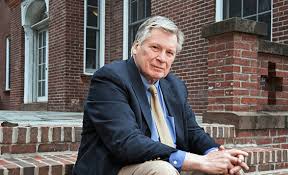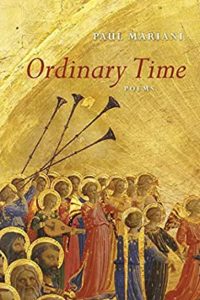Paul Mariani has given a new perspective on “ordinary time.”
In the liturgical calendar of the Roman Catholic Church, “Ordinary Time” is the period that falls outside the seasons of Advent, Christmastide, Lent, and Easter. It’s divided into two parts — from Christmastide to Lent, and from Pentecost to Advent. Mariani uses the idea for the title of his latest collection of poetry, Ordinary Time. Instead of the period or periods that fall outside the official church holiday observances, he uses it to focus on what we might call “the rest of life.”
And what is the rest of life? Childhood and growing up. Parents. Grandchildren. Vacations and visits. What happened when his rough-and-tumble father learned Mariani was writing poetry. Discovering the madness of Mardi Gras in New Orleans. Teachers. His young mother trying to drive a car in New York City. His mother reaching out to a young woman whose husband has just died in World War II Europe. What East 51st Street in New York was like in the early 1940s, and how that world vanished.

Paul Mariani
In other words, Mariani is defining “ordinary time” as life, what happens in between births and graduations and weddings and funerals. In other words, the ordinary time of life includes an element of the sacred.
Mariani is University Professor Emeritus at Boston College. Born in 1940 in New York City and raised on Long Island, he was the oldest of seven children. He has published several biographies and eight poetry collections, of which Ordinary Time is the latest. His biographies include works on William Carlos Williams, Gerard Manley Hopkins, Wallace Stevens, John Berryman, Robert Lowell, and Hart Crane.
His awards and honors include a Guggenheim Fellowship, several fellowships from the National Endowment for the Arts and National Endowment for the Humanities, the John Ciardi Award for Lifetime Achievement in Poetry, and the Flannery O’Connor Lifetime Achievement Award.
And yet there was a day, in 1956, when all of this esteemed and honored future hung in the balance.
When My Father Found Out I Was Writing Poetry

to Camp Baumann in Merrick
it was the summer of ‘56
he pulled the dump truck over
to the side off Old Country Road
turned off the engine and gripped
both hands around the steering wheel
I hear you’re writing (there was a slight
pause and then he spat out the word)
poetry is it true he wanted to know
there was another pause this time mine
I’d written a poem or two and I was
thinking to myself holy crap what do
I do now caught as I was then I said
yes I had but really it was no big deal
well he said in a low voice, you’re still
my son and then he turned the key
and the engine started up and soon
we were back on the road heading south
and me about to start another day
gathering the golden droppings
of Bob Baumann’s horses in their Pegasian
stables down by the pines relieved
to know I was still my father’s son.
It must have been a watershed year; Mariani has another poem in the collection about what happened when he was 16, and his father told his mother that wanted Paul to quit school and get a job to help with the family finances.
I read these wonderful story-like poems, and I’m reminded of my own ordinary time. I think of the neighborhood I grew up in, not unlike Mariani’s on Long Island. I consider my own uneasy relationship with my father. I can’t help but be reminded of my hometown of New Orleans, when I read not one but several poems in this collection about the Mississippi River, Mardi Gras, and the French Quarter.
That’s what Mariani has done with Ordinary Time. He’s taken the experiences of his own life to remind us of the experiences of ours. And perhaps it’s not the big events but the small, almost-forgotten things that make a life.
Related: The Whole Harmonium: The Life of Wallace Stevens by Paul Mariani.
Photo ai3310x, Creative Commons, via Flickr. Post by Glynn Young.
__________________________

“I require all our incoming poetry students—in the MFA I direct—to buy and read this book.”
—Jeanetta Calhoun Mish
- Poets and Fables: Steven Flint and “The Sun and the Boy” - July 3, 2025
- Poets and Poems: Alison Blevins and “Where Will We Live if the House Burns Down?” - July 1, 2025
- Poets and Poems: Paul Pastor and “The Locust Years” - June 26, 2025

Megan Willome says
That poem you shared is striking in its almost complete lack of punctuation, but notice where he put the one comma.
Glynn says
Right at the point of crisis resolution.
Richard Maxson says
I just finished a book by Marie Howe called, “The Kingdom of Ordinary Time,” much like Mariani’s.
We will be running a poem from Howe’s book at the end of this month—one quite pertinent to the ubiquitous disease with which we find ourselves coping.
I was raised Catholic and yet had never heard the term “ordinary time” in any sense. Now, having learned of these interim periods of time, it seems it is those time period that give rise to the need for those sacred periods of sacrifice and meditation on how times fit together.
Thanks for bringing this book to our attention, Glynn.